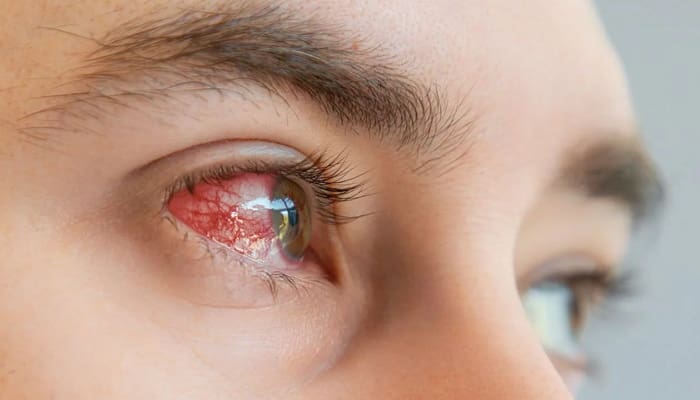Зміст
Allergic conjunctivitis is characterized primarily by redness and burning of the conjunctiva, itching in the eyes and constant tearing that is difficult to control. The disease is one of the most common eye diseases.
Allergic conjunctivitis can be permanent or seasonal, depending on the allergen that causes it. Regardless of the cause, the condition should be a reason to visit an ophthalmologist.
Allergic conjunctivitis
Allergic conjunctivitis in children and adults develops for a variety of reasons. They can be caused by many allergens, so one of the first diagnostic tasks is to determine the cause of the disease. Allergic conjunctivitis can be seasonal (for example, with an allergy to pollen) or permanent (with an allergy to dust, mold or mites, which are very difficult to get rid of at home).
The most common factors causing allergic conjunctivitis are:
- animal hair (cats, hamsters, guinea pigs) – an allergic reaction can occur upon contact not only with the animal, but also with its owner, who transfers the pet’s fur, epidermis, or secretions to his clothes; burning and itching in the eyes also appear after visiting a pet store;
- flower and tree pollen – cause seasonal allergies;
- dust, mold, mites – these are some of the most difficult to combat allergens with which the patient comes into contact both at work and at home;
- metals (platinum, aluminum, chromium, vanadium, nickel) – usually cause skin allergies, and in large quantities can cause conjunctivitis;
- chloramine, rosin, vinyl chloride, dyes used to process plastic – people with allergies to these ingredients should not work in the chemical or furniture industry at all.
People employed in the baking industry, food production and distribution, fruit and dairy processing, and the pharmaceutical industry are exposed to a very large number of allergens. New furniture or carpets often contribute to the development of allergic conjunctivitis. They are allergic to chemicals, cosmetics, and paints.
Read also: Spring allergies: remedies for pollen allergies
Allergic conjunctivitis – symptoms
Allergic conjunctivitis most typically manifests itself:
- itchy eyes,
- burning eyes,
- redness or hyperemia of the conjunctiva,
- severe tearing
In most cases, patients also experience a runny nose, sneezing and itchy nose. In the case of seasonal allergies, the symptoms are much more severe. If exposure to an allergen is too great, acute conjunctivitis may occur, with symptoms such as:
- visible swelling of the conjunctiva,
- very unpleasant itching,
- watery eyes that are difficult to control.
In chronic allergic conjunctivitis, the symptoms are milder, mainly mild itching and burning of the eyes. Some patients experience a runny nose or a constant feeling of nasal congestion.
Diagnosis of allergic conjunctivitis
Conjunctivitis, both allergic and seasonal, is very easy to recognize. Most often, the patient himself knows what led to sneezing, watery eyes and burning eyes – contact with pollen, being in a park, forest, or meadow.
In case of acute inflammation, a visit to an ophthalmologist is necessary. The main thing is to determine whether the inflammation was caused by an allergen or, for example, an infection. In addition, some people develop dry eye syndrome, which indicates an exacerbation of a chronic disease that requires additional diagnosis. In some cases, antibodies to specific allergens and conjunctival provocation are also determined.
Allergic conjunctivitis – treatment
Eye drops for allergic conjunctivitis are a remedy that helps fight painful symptoms, but the first thing the patient should do is to limit contact with the allergenic substance as much as possible. In addition, you should rinse your eyes frequently to flush out allergens from the conjunctival sac. For this purpose, it is good to use saline solution or so-called artificial tears – over-the-counter drops for allergic conjunctivitis. Cool compresses provide relief to swollen eyelids. In most cases, the above treatment methods are sufficient, but if the symptoms are very severe, it is worth visiting an allergist and undergoing immunotherapy, i.e., desensitization. Another way to combat allergens that cause itching and burning in the eyes is to take antiallergic medications (in the form of tablets or drops).
Eye whitening drops for allergic conjunctivitis provide temporary relief, but can only be used occasionally. Chronic use of drugs of this type can lead to disruption of the tear film, persistent eye congestion, and in extreme cases, the development of glaucoma.








